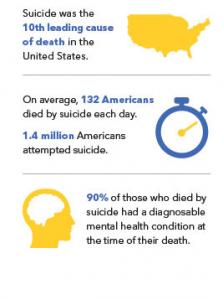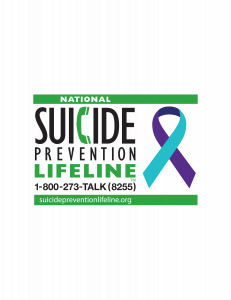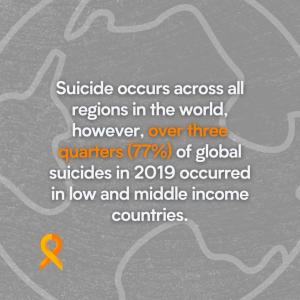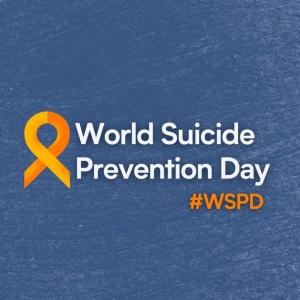Observe & Support World Suicide Prevention Day with We Level Up Treatment Center
The fabric of our community can be strengthened when we all contribute to improving mental health challenges faced by so many.
Support World Suicide Prevention Day
As part of society, we owe it to ourselves to help the needy, sick, and suffering, when and where we can. Suicide prevention day should be a day to remember those, often left behind, and with no one to confide in during the darkest moments of their lives. This is not to detract from the fact that it is harrowingly sad and tragic when this happens, but that it is always preventable. While it is certainly true that some people are given much less of a chance to succeed in life, nobody should ever "fall through the cracks" and be left without the help they need. While everyone goes through struggles in their lives that are very intense some people may suffer more and do so alone, this is what must be avoided. When people suffer without professionals to soften the blow they are more likely to think of suicide as an option.
"The fabric of our community can be strengthened when we all contribute to improving mental health challenges faced by so many. Treatment at a suicide prevention center can make a critical difference to those suffering." Stated Ryan Zofay, founder of the We Level Up Series and Centers, professional speaker, and coach.
– International Associate for Suicide Prevention
Preventing Suicide: A Global Imperative
77% of global suicides happen in low- and middle-income countries. [3] Ingestion of pesticides, hanging, and firearms are among the most typical means of suicide globally.
For people aged 15 to 29 suicide is the second most common cause of premature death, second only to car accidents. Women specifically, in this age group, are most likely to die prematurely from maternal conditions, and the second most common cause of death for them is suicide as well. Lastly, for young males aged 15 to 19 suicide is the third most common way to die prematurely, after card accidents and interpersonal conflicts. [4]
Suicide deeply impacts family and friends and often leaves them grieving for many years.
- Biggest risk factors for suicide
The correlation between suicide and mental disorders (most notably depression and alcoholism) is very large in higher-income countries. A majority of suicides happen quickly and impulsively during a crisis. When a young adult faces extreme difficulty with finances, interpersonal relationships and substance abuse they are at the greatest risk of suicide.
While sudden crisis brought on in early adulthood is a large reason for suicide, traumatic events that are undealt with are nearly just as common a reason for suicide. Some groups in America are more prone to traumatic experiences, such as refugees, migrants, indigenous peoples, lesbians, gays, bisexuals, transgender, intersex individuals (LGBTQI), and convicts. Previous suicide attempts also place one at high risk.
The majority of suicides (at 77%) happen in lower-income countries, these lower-income countries face food scarcity and violence, unlike most first-world counties. A staggering 703,000 people die of suicide each year, furthermore, there are more than 20 suicide attempts for each suicide. The effect of one person committing suicide is tremendous. Not only the person's family, but their whole community receives a shockwave effect.
Typical Suicide Warning Signs:
Verbalizing thoughts or feelings about wanting to end their life, or talking about feeling hopeless, or having no reason to live
Expressing feelings of loneliness, and withdrawal from others, resulting in extreme social isolation
Expressing feelings of being a burden to others, or being in unendurable pain
Unrest, violence, distress, or difficulty in interacting are also very common
A change in eating, hypersomnia (sleeping too much) or insomnia
Signs of cutting or self-harm
Arranging end-of-life personal affairs, such as writing a will; and absence of supportive family members, or other psychosocial support
Remember to consider And Assess The Risk Factors For Suicide
Other risk factors include:
Previous suicide attempts
Depression
Alcohol or drug use problems
Other mental health conditions such as psychosis or bipolar disorder
Severe emotional distress
Chronic pain or illness
Events of trauma (e.g., sexual, and interpersonal violence, war, abuse, discrimination)
A recent loss (e.g., unemployment, bereavement, relationship break-up)
Financial problems
World Suicide Prevention Day Awareness and COVID-19
The COVID-19 Pandemic has added to increased feelings of isolation and vulnerability to many individuals.
Really anything that puts undue stress and causes isolation or solitude is a risk factor. COVID 19 has forced at risk people to spend large amounts of time in isolation and increase their stress, increasing risks. This is not unprecedented, according to The National Biotechnology Center Suicides rose during the influenza pandemic (1918–19) and the SARS outbreak (2003) for elderly persons in Hong Kong (the same being true for any previous pandemic). There are numerous issues concerning how COVID isolation has impacted people, not to mention political and economic stress in the U.S. concerning issues such as contagion fear, anxiety, and chronic stress.
For some, there is even a higher risk associated with the social stigma for having contracted COVID 19.
So, if you are concerned about yourself or someone in your family or community, reach out to them and ask, “Are you okay?” Checking in and offering broad-minded care can make a difference! Get help at your local rehab recovery resource center.
Preventing Suicide
According to the International Association for Suicide Prevention [6], there are five reminders for us on how to prevent suicide:
1) ‘Creating Hope Through Action’: A reminder that our actions, no matter how small or big, may provide hope to those who are struggling.
Suicidal thoughts.
2) Also, the circumstances and causes that lead to suicide are complicated, no single approach works for everyone. We know that certain aspects and life experiences can make someone more susceptible to suicide and can lead to extreme stress, despair, and isolation.
3) You can help give someone hope by showing that you care: We may never how small actions to brighten someone's day can help. We all can reach out and help someone. You do not need to tell them what to do or have solutions, but simply making the time and space to listen and practice empathy can really save someone's life.
4) The insights and stories of people with a lived experience of suicide: It can be compelling in helping others understand suicide better and encourage people to support someone and reach out for help themselves. In this case, the person sharing their story needs to be extremely prudent as to not encourage the behavior or justify it.
5) Individuals sharing experiences of being bereaved through suicide and how they came to live their new and improved lives, can help others experiencing suicidal thoughts make sense of why it is never a decision that will end well. Sometimes, when somebody dies by suicide, their surviving family and friends may encounter shock, anger, guilt, symptoms of depression or anxiety, and may even share suicidal thoughts too.
World Suicide Prevention Day
‘This day has spurred campaigns both nationally and locally and has led to raising awareness and reducing stigma’. – IASP
What you can do to help,
Steps On How To Approach Someone Struggling With Suicidal Ideation
Allot sufficient time to talk to the person in a private space, show empathy, and establish a positive rapport
Lead into the issue gradually, measure the person’s current mental state before asking straight if they have thoughts about suicide. Asking about suicide does not motivate suicide but can lessen anxiety and helps the person feel understood.
If the person confirms that they have thought of or are thinking about suicide, ask follow-up questions to determine whether they have made firm plans.
If The Person Has Suicidal Ideations, But The Goal Is Not Concrete Or Immediate
Offer emotional support, inspire them to talk about their suicidal feelings, remind them of their strengths; encourage them to talk of how they fixed problems in the past, and explore reasons and ways to stay alive.
Give them with details of a mental health specialist if possible, and keep regular contact, initially by making another appointment; and
Activate psychosocial support by reaching out to family or friends and community resources, and give details of community services, including crisis lines.
If the person has a solid plan, including the means and the intention to die, stay with the person, remove the means of suicide. Ask a mental health
specialist and designate a family or staff member to stay with the person so that they are not alone until further specialist support is in place.
After a suicide attempt, make sure the person knows available community services to provide support and a plan for regular and well-coordinated follow-up contact.
Explain to the person and their family the advantages of staying in connection with health services.
Addiction Facts For World Suicide Prevention Day
The connection of alcohol and drugs with suicidal ideation and behavior is very real, and very common. Feeling hopeless is much more common when someone is abusing drugs and or alcohol.
Alcohol and drugs commonly lead to suicidal thoughts because of chemical imbalances. When chemical imbalances are thrown off it can be literally impossible for someone to have positive thoughts about themselves.
This becomes an even larger problem when the person gets addicted to drugs and or alcohol. Over half of all suicides have a correlation with alcohol and drug dependence, and 25% or more of alcoholics and drug addicts will commit suicide. Moreover, over 70% of adolescent suicides may have complications with drug and alcohol use and dependency. Because alcoholism and drug addiction are leading risk factors for suicidal behavior and suicide ideation, any alcoholic or drug user should be evaluated for suicide, mainly if actively using alcohol or drugs and given addiction treatment. [8]
People that are addicted to drugs and or alcohol often have underlying mental health problems that were worsened by their using. When you see just how common depression, anxiety, addiction, and financial problems go together, you can see how addiction can cause suicide. The silver lining is that people are really starting to realize how damaging addiction can be to adolescents and are taking practical countermeasures to fight addiction in young people.
World Suicide Prevention Day Is A Reminder To Ask For Help
Mental illness and mental disorders are surrounded by a lot of stigmas, this can make it even harder for people affected to ask for the help they need. Part of the reason why suicide rates are so high In the world is that the issue is so taboo, people don't even want to talk about it at all. Now that the taboo nature concerning the realities of suicide is being dismantled, those that can make the greatest difference are laying the groundwork for everyone to help. This includes walks for awareness, education on suicide, hotlines, and conventions for therapists and psychiatrists.
As World Suicide Prevention Day comes to a close, we help that we can fully break down any stigmas associated with suicide so that those affected can feel free to reach out for the help they need, and not feel afraid.
About We Level Up Treatment Centers
We Level Up is a renowned treatment center that applies evidence-based treatment modalities and holistic programs to improve client recovery outcomes—combining traditional elements of SUD treatment, including supervised medical recovery coupled with intensive behavioral rehab.
Offering cutting-edge advanced therapies, We Level Up is an accredited dual diagnosis mental health care provider. Fully integrating dual diagnosis conditions into our programs. Most importantly, our top-notch doctors, therapists, and counselors leverage the power of science to help clients succeed in rehabilitation recovery.
We provide exceptional addiction and mental health treatment across the U.S., with amenities and activities formulated to encourage the most progress possible. Each client gets lifetime alumni support post-inpatient treatment, along with family help resources. These resources maintain recovery momentum, after departing our centers. At We Level Up, our vision is to create legions of self-empowered individuals who are entirely in control of their lives and destinies, thus enabling them to get what they want out of life, and have real fun in the process.
Who Is Ryan Zofay?
In 2019 he founded the Level Up Development Series. Level Up is a unique development program that provides attendees with the tools and knowledge to eliminate limiting thoughts from their lives and to reach their full potential.
Ryan Zofay is most passionate about sharing his practical lessons that change lives. As a successful entrepreneur and motivational speaker, he teaches development strategies that improve performance, connection, and overall mindset.
Using the teachings of his successes and tribulations, Ryan has a unique ability to facilitate significant change for individuals and organizations. In addition, Ryan’s passion and enthusiasm readily spill over to his listeners.
Moreover, his life accounts, incredible comeback journies, along with the wisdom he developed, help formulate life improvement.
Sources:
Ryan Zofay Events - https://welevelup.com/coaching/the-level-up-event-by-ryan-zofay/
Self Harm Resources - https://welevelup.com/mental-health/self-harm-treatment/
Suicide Risk - https://pubmed.ncbi.nlm.nih.gov/1932152/for
Ryan Zofay
We Level Up Treatment Center
+1 561-678-0917
email us here
Visit us on social media:
Facebook
Twitter
LinkedIn
We Level Up Addiction & Mental Health Treatment Center
Legal Disclaimer:
EIN Presswire provides this news content "as is" without warranty of any kind. We do not accept any responsibility or liability for the accuracy, content, images, videos, licenses, completeness, legality, or reliability of the information contained in this article. If you have any complaints or copyright issues related to this article, kindly contact the author above.





